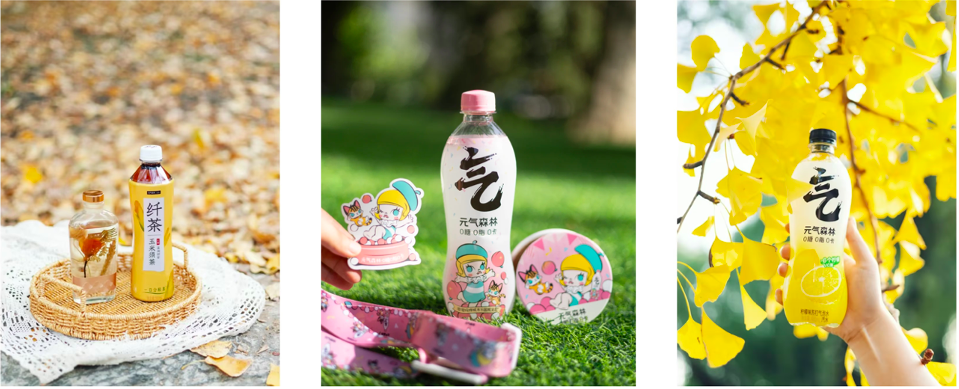Founded in 2016, Chi Forest (previously known as Genki Forest) is a Chinese soft drink brand that specializes in sparkling water and instant tea. It is also renowned for its low-calorie, low-sugar products, catering to the Chinese Generation Z and Millennials, who seek healthier consumer options. Being only 7-year-old Chi Forest became the fastest-growing beverage brand in China. In 2022, Chi Forest topped the list in an iiMedia survey, with 74% of 1,767 consumers expressing a preference for it as their go-to sparkling water brand. Despite the success in the domestic arena, most recently Chi Forest went through major renovation campaigns that were focused on the brand’s positioning, image, and general product features. Regular customers have been starting to notice differences on the shelves in convenience stores and vending machines. Previous flavor variety switched to the dominance of the brand’s new Coca-Cola flavor, introduced earlier this year.
Download our guide to Chinese gifting habits
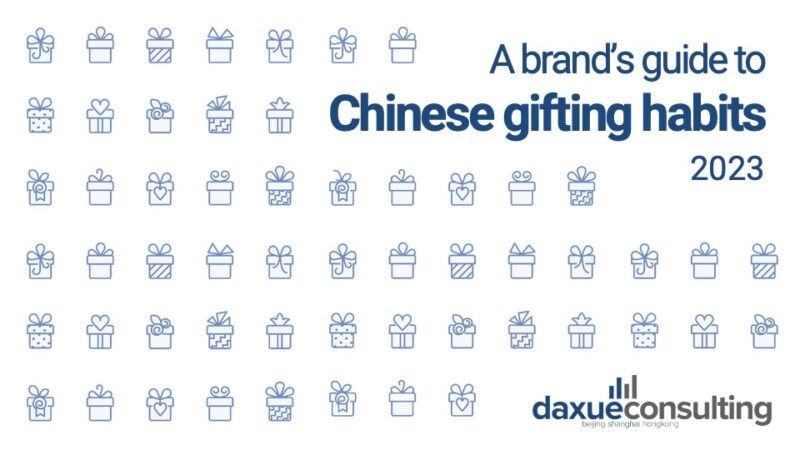
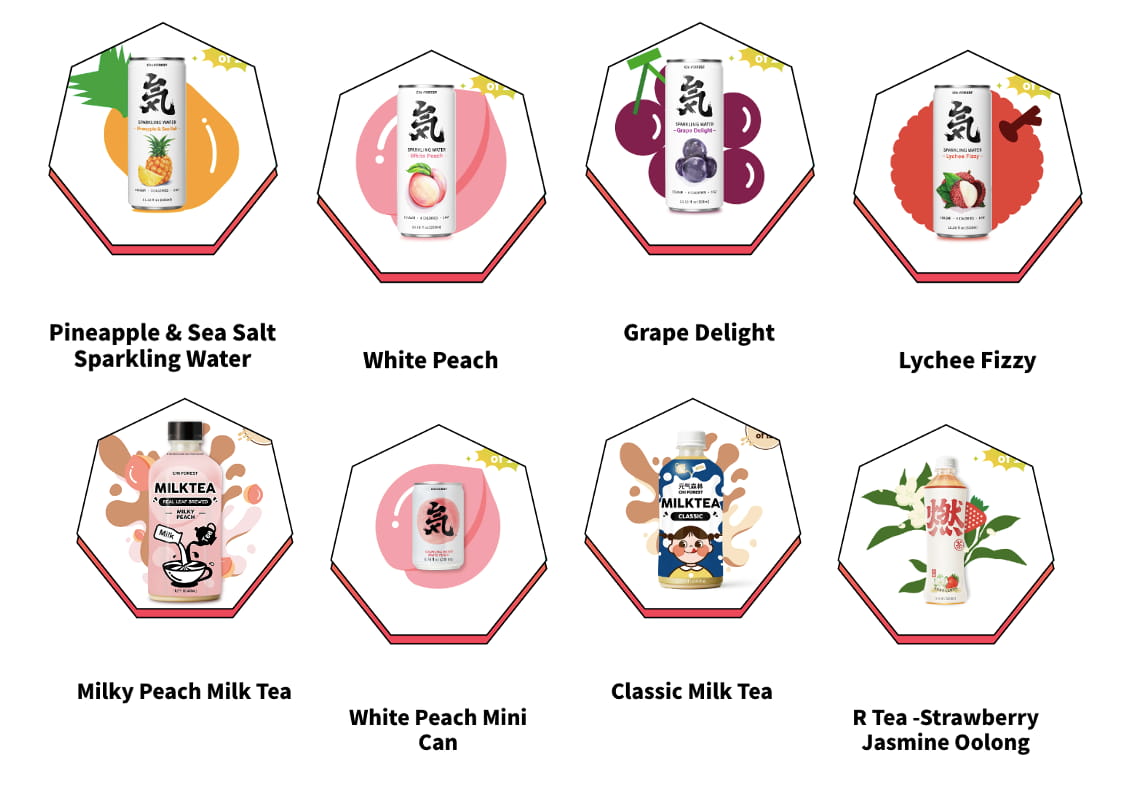
New name, new flavors, new image – welcome Chi Forest
Stage 1: Major rebranding and moving away from being “pseudo-Japanese”
Upon the initial launch of Genki Forest Sparkling Water, the bottle featured the kanji 気, meaning “gas/air,” leading consumers unfamiliar with the brand to mistakenly perceive the product as Japanese. In this way, the brand carried a strong psychological implication of “safety,” facilitating quick purchase decisions and recognition among other beverages.
However, after the initial success, the brand has been accused of misleading customers and plagiarizing the packaging of two Japanese brands, Fujiya and LUPICIA.
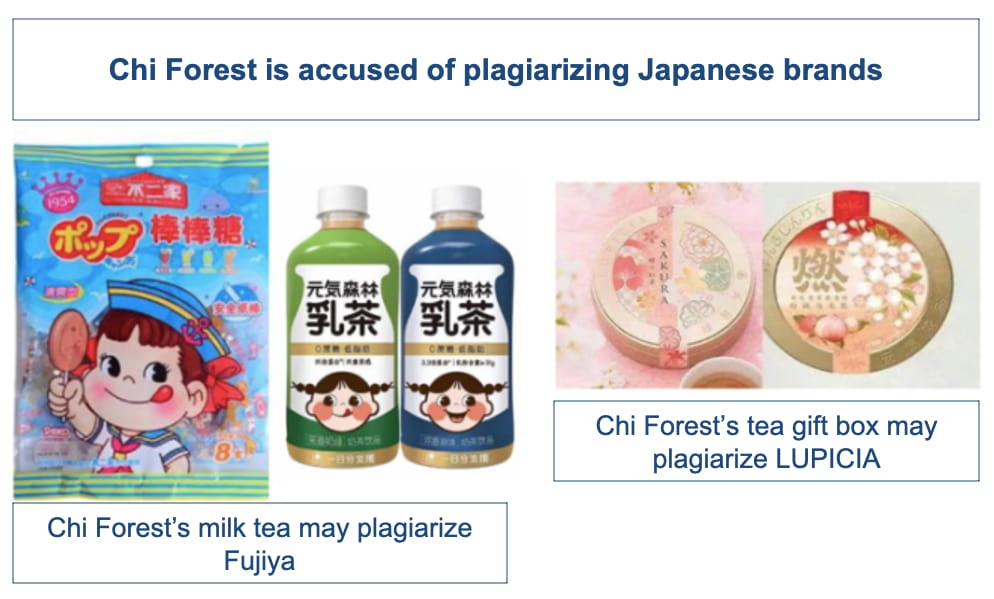
Recognizing the need to shift away from the label of “pseudo-Japanese style,” the brand started transitioning from “Yuanji Forest” (Genki Forest) to “Yuanqi Forest” (Chi Forest). In February 2023, Chi Forest underwent a redesign of its main logo, now featuring the simplified Chinese character ‘气’. Aligned with the growing cultural confidence among Chinese consumers, Chi Forest underwent a rapid transformation. The brand accentuated key Chinese trends through solar term posters, traditional gift boxes, and national-style activities. This shift allowed the leading domestic sparkling soft drinks brand to seamlessly transition from its previous “pseudo-Japanese” identity to an authentic embodiment of “Guochao” overnight.
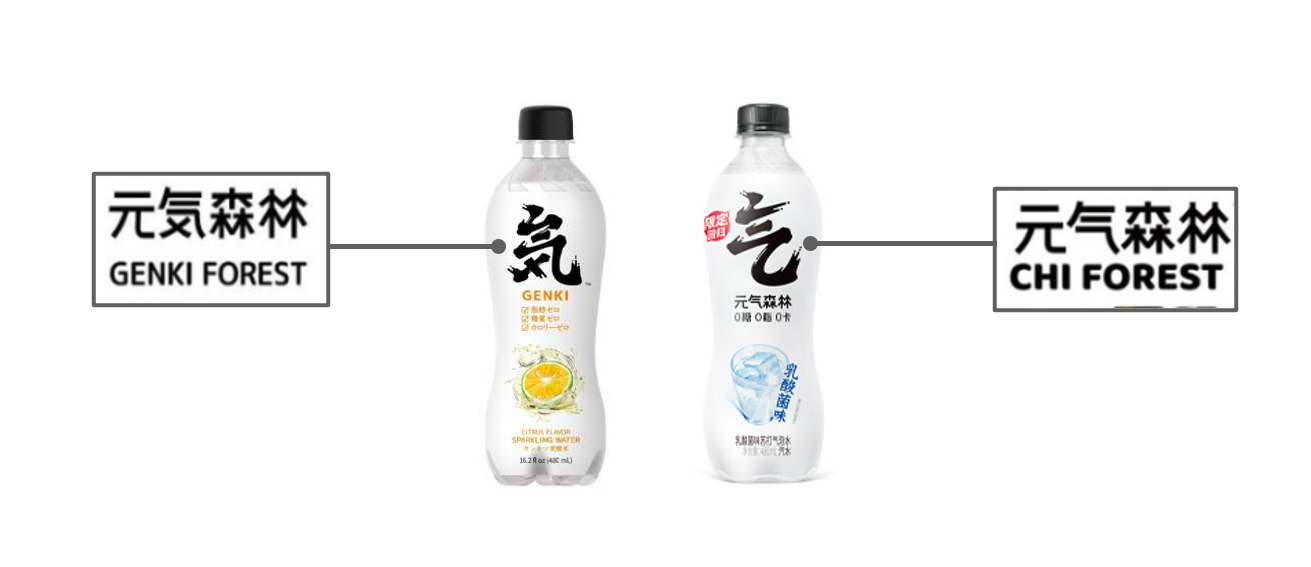
Interestingly to highlight, such changes have also been spotted among other domestic brands. The closest example from the beverage market would be the milk tea brand “Nayuki” recently renamed “Naixue”.

Stage 2: Modifying the taste while maintaining health-benefits
Chi Forest’s commitment to crafting healthy soft drinks is reflected in its marketing message: “low sugar, low fat, low calories.” To cater to the growing demand from health-conscious consumers focused on weight control, the brand innovatively uses natural sugar substitutes, such as erythritol, to precisely manage sweetness and calorie content. The brand became one of the first to use the marketing concept of “0 sugar, 0 fat, 0 calories,” solidifying its position as a pioneer in providing healthier beverage choices.
Furthermore, to prove its soft drinks are healthy, it cooperated with a KOL @DaddyLab (老爸测评) who used professional testing methods to produce scientific evidence to show Chi’s soft drinks are really “low sugar, low fat”.
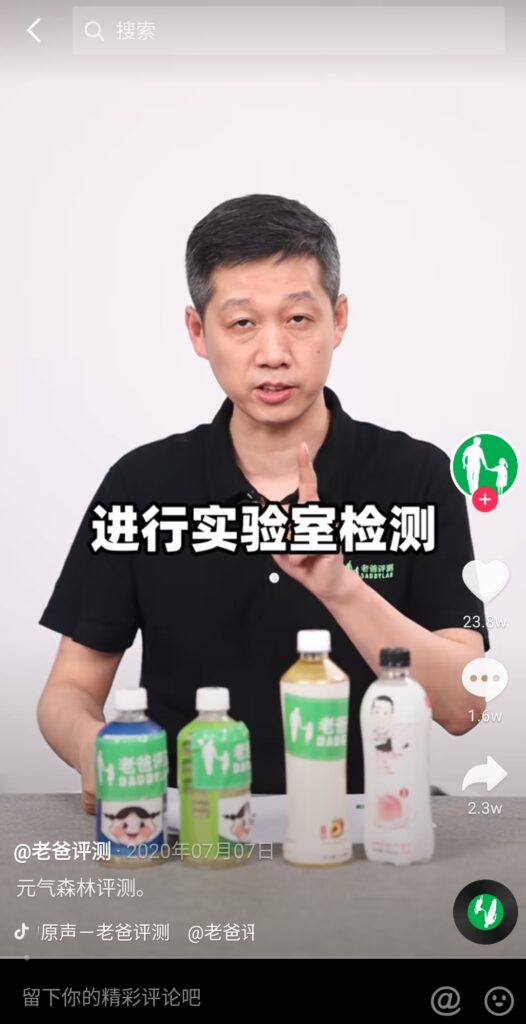
Tang Binsen, the founder of Chi Forest, emphasized that the company’s values are reflected in the ingredient list and where the company allocates their resources. Moreover, the main goal of achieving “0 preservatives” across all products is not only inclusive of common preservatives but specifically targets the elimination of additives such as potassium sorbate and sodium benzoate.
The launch of 2.0 Version of sparkling water
In line with its mission, the brand launched the 2.0 version of sparkling water, prioritizing both taste and health.
This innovative approach focused on several significant features, making it a standout choice for consumers seeking both refreshment and well-being. First, the gas content was increased to highlight the “击喉感” (“throat sensation/ throat feeling”). Second, the flavor was adjusted to balance the sweet and sour notes. Third, by removing the caffeine and replacing it with green tea extract, Chi Forest ensured that their 2.0 version of drinks would keep consumers energetic throughout the day. Remarkably, to achieve those features, the R&D team even developed a patented technology called Chikit.
Stage 3: Chi Forest’s most important new product in 2023 – cola-flavored sparkling water
To this day, the Coca-Cola Company dominates the Chinese soft drinks market, holding a 55% market share in 2019. According to its 2022 annual report, Coca-Cola’s net revenue was USD 43 billion, and a year-on-year increase of 11%.
Looking further at the recent trends, sugar-free options became an integral addition to the existing brand’s product line. According to the financial reports and predictions on 2023 growth outcomes, sugar-free Cola can even outperform original flavored sodas by 5% to 7%.
Thus, spotting the developmental trajectory, Chi Forest is determined to successfully market its own Cola and compete with the US giant for the consumers’ favor. Yu Haiyu, one of the heads of the sparkling water brand, even said that cola-flavored sparkling water is Chi Forest’s “most important new product in 2023.”
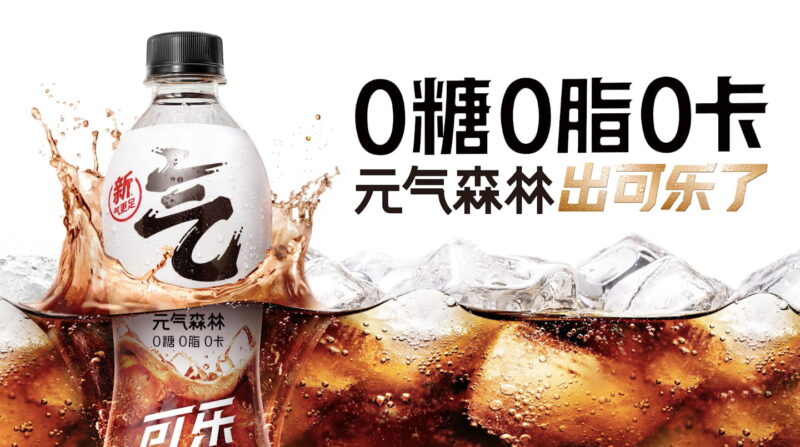
A holistic approach to the marketing strategy through cooperation with different levels of influencers
Chi Forest in China works with different tiers of celebrities, KOLs, KOCs and top celebrities, to boost the popularity of its soft drinks. This strategy allows to reach and influence consumers through diversified channels and multiple perspectives.
Top Celebrities
At the top of this “influential hierarchy”, there are well-known celebrities who can create momentum and huge traffic, for instance, those are actors, idols, and singers.
One of the most successful examples is the collaboration with Eileen Gu before the 2022 Beijing Winter Olympics. After she won two gold medals and became an international sensation, Chinese netizens referred to the Beijing-based brand as the “biggest winner of the game” on social media. Brands have started to prefer signing with athletes over entertainment stars in China since they are deemed empowering and inspiring faces of the brand, as well as being more reliable and less likely to be involved in scandals.
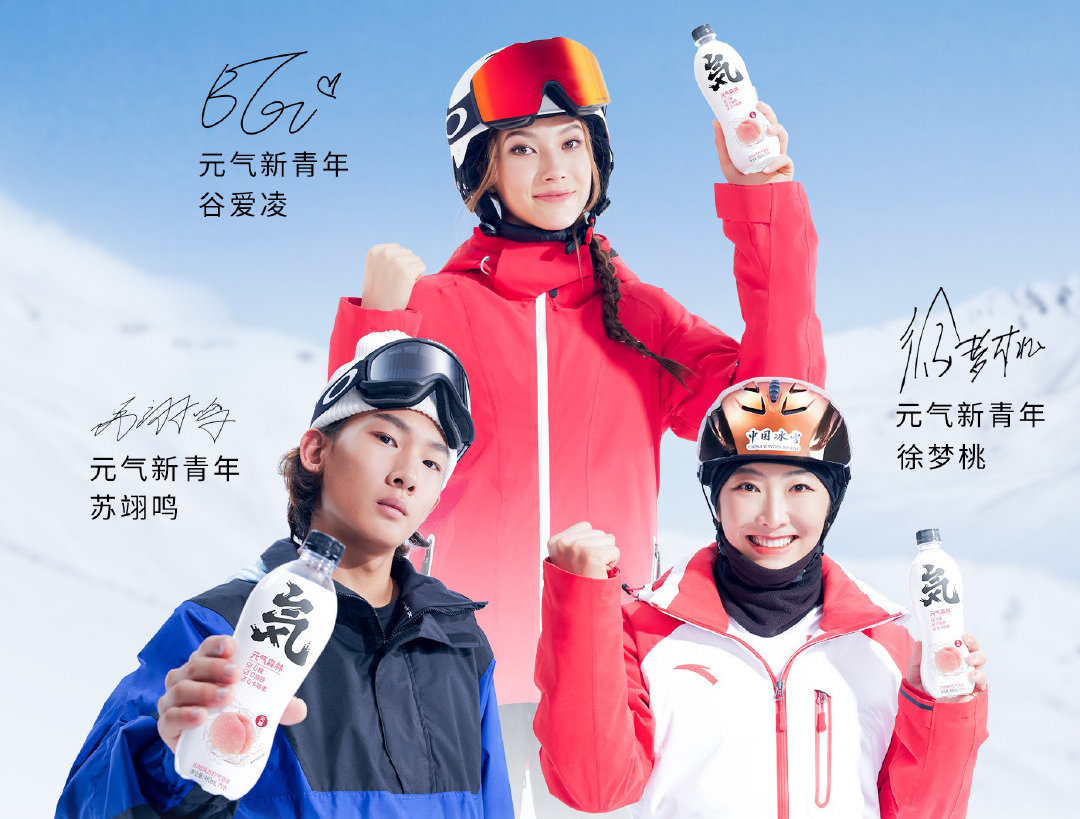
KOLs
Chi Forest in China also leverages the power of high-profile KOLs who produce quality content for a large following. The brand strategically cooperated with internet sensation Li Jiaqi to promote its milk tea and sparkling water through live-stream broadcasts.
KOCs
KOCs also play a key role in the Chi’s marketing strategy. Since they are everyday consumers, KOCs are relatable and their feedback is perceived as more reliable by consumers. They are able to penetrate niche consumer segments and are usually deemed more credible than KOLs despite their smaller follower base.
Distribution through both convenience stores and e-commerce
Breaking down Chi Forest’s retail channels, can be observed that, as of 2021, offline retail, such as convenience stores, and the sum of supermarkets, restaurants, school shops, vending machines, and so on, accounted for 35% and 39% of its total B2C sales, respectively.
Moreover, the Chinese soft drink brand strategically capitalizes on the fast growth of chain convenience stores in China. By establishing a presence in these stores, Chi Forest enhances accessibility for everyday shoppers, including students and white-collar workers. The advantage of leveraging chain convenience stores lies in their standardized management processes, enabling streamlined purchasing and efficient offline marketing. In addition, having products sold offline in chain convenience stores contributes to building a robust brand reputation. The frequent visibility of Chi Forest products on store shelves allows customers to become familiar with the brand, reinforcing its presence in the market.
On the other hand, e-commerce shops, including Tmall and JD flagship stores, account for roughly 25% of total sales. For instance, through close cooperation with Tmall, Chi Forest joined different marketing activities like Tmall HeyBox, a platform supporting new releases.
What is coming next: further expansion and overseas strategy
In May 2021, Chi Forest’s first canned sparkling water was introduced in the US. Being the birthplace of sodas, the US was in fact the brand’s first target for overseas strategy. White Peace and Lychee Fizzy have been Chi’s most popular flavors in the US. By December, the Beijing-based soda brand was included in the top 10 Amazon Best Sellers in Sparkling Drinking Water in the States. Additionally, it was included in the top 3 New Releases in Sparkling Drinking Water (the only Chinese soft drink brand to do so).
By 2023, Chi Forest’s products entered more than 40 countries worldwide. The company has announced its plans to open overseas factories in the next 2-3 years and introduce foreign ingredients to the drinks – which could mean limited-edition flavors of drinks according to region. In addition, they have announced plans to carry out overseas mergers and acquisitions.
The drive for innovation and improvement – the road to Chi Forest’s success domestically and worldwide
- Genki Forest shifted from a perceived “pseudo-Japanese” style to an authentic Chinese identity, aiming to align with Chinese consumers’ growing national sentiment.
- Chi Forest positions itself as a producer of healthy soft drinks, emphasizing on “low sugar, low fat, low calories”, with natural sugar substitutes like erythritol.
- The introduction of a 2.0 version of sparkling water prioritizes taste and health, featuring increased gas content and the patented Chikit technology.
- Recognizing the popularity of Coca-Cola, the Chinese soft drink brand plans to focus on cola-flavored sparkling water in 2023.
- Utilizing celebrities, KOLs, and KOCs, Chi Forest employs a comprehensive influencer strategy to reach diverse audiences through various channels.
- Leveraging both offline and online channels, Genki Forest strategically places products in convenience stores, supermarkets, and collaborates with e-commerce platforms like Tmall and JD.
- The Chinese carbonated drinks manufacturer expanded into the US and over 40 countries, planning overseas factories, the use of foreign ingredients, and potential mergers and acquisitions for global reach.


